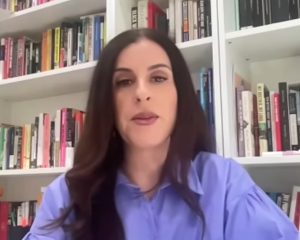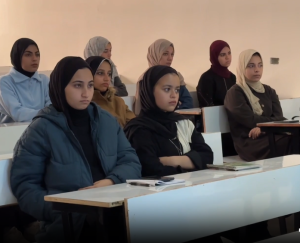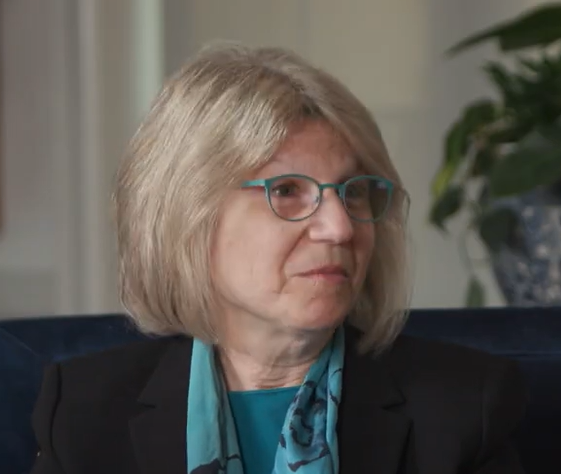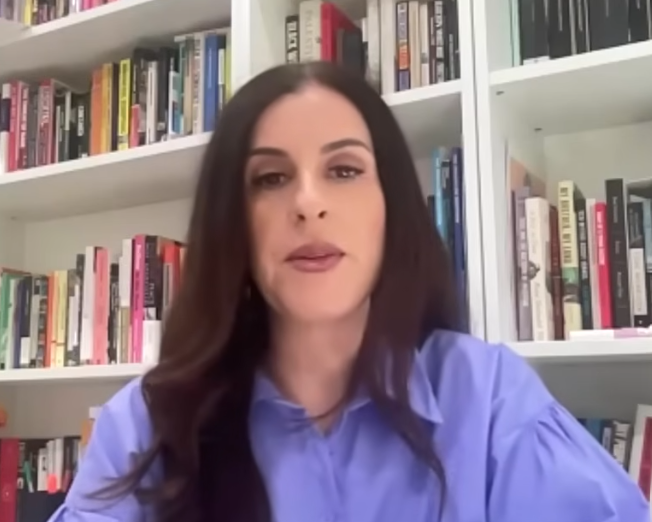13 October 2025
Sally Kornbluth, President of MIT (pictured), who failed to defend her students last year when facing a Congressional committee bent on intimidating her into suppressing free speech on Israel/Palestine, has found her spine and flatly turned down Trump’s ‘deal’ which involves suppressing free speech and yielding control over admissions in return for access to federal research funds. (In language Josef Goebbels could scarcely have outdone, Trump calls it a “Compact for Academic Excellence in Higher Education”.) The eight other American universities that have received Trump’s offer have yet to respond. Much will depend on their response, since any positive responses will probably encourage him to extend the offer to all universities in receipt of federal funding. The following report comes from BUILA, the British Universities International Liaison Association. Below that, Kornbluth’s letter rejecting the bargain is appended.
MIT rejects Trump’s preferential funding offer
MIT president Saly Kornbluth said the agreement went against freedom of expression and the university’s independence, and that it was “fundamentally” inconsistent with MIT’s “core belief that scientific funding should be based on scientific merit alone”.
Last week, the Trump administration sent a compact to nine US colleges laying out sweeping demands including capping international enrolments, banning the use of race or sex in hiring and freezing tuition for five years. In return, schools that signed on would receive competitive advantages from the government.
In a letter to US education secretary Linda McMahon, Kornbluth said: “We must hear facts and opinions we don’t like – and engage respectfully with those whom we disagree.”
Under the terms of the compact, signatories must abolish university units that “punish” or “belittle” conservative ideas, and all college employees “must abstain in their official capacity from actions or speech related to politics”.
If adopted by the institutions, it would set a 15% cap on international undergraduate students including a 5% limit for any given country. It also stipulates that universities must hand over international student information, including discipline records, upon the request of the government.
MIT is the first of the nine institutions to officially respond to the administration before the October 20 deadline. Stakeholders said the White House is likely aiming to expand the compact if institutions engage.
The day after it was sent, the University of Texas swiftly announced it was “honoured” to be a part of Trump’s proposal, though the remaining institutions were notably quiet on the agreement, which has received strong pushback from faculty leadership and administrators.
Faculty senates at the University of Virginia and the University of Arizona voted to oppose the compact with overwhelming majorities, while Dartmouth College president said in a statement she was “deeply committed” to the university’s values and would always defend its “fierce independence”.
In Tennessee, academic and workers unions have called on Vanderbilt University to reject what they called “Trump’s Fascist Compact”, with a petition from Graduate Workers United garnering almost 1,000 signatures as of October 8.
Elsewhere, California governor Gavin Newsom quickly responded saying: “California universities that bend to the will of Donald Trump and sign this insane ‘compact’ will lose billions in state funding – IMMEDIATELY.”
“California will not bankroll schools that sign away academic freedom,” he wrote on October 2, sending a clear sign to the University of Southern California (USC), the only Californian college to receive the proposal so far.
Alongside MIT, the compact demands were thrust upon: Vanderbilt University, Dartmouth College, the University of Pennsylvania, the University of Southern California, the University of Texas, the University of Arizona, Brown University and the University of Virginia.
California universities that bend to the will of Donald Trump and sign this insane ‘compact’ will lose billions in state funding – IMMEDIATELYGavin Newsom, Governor of California
While it remains unclear how the recipients were chosen, stakeholders have noted that the list includes high prestige universities as well as public flagships, likely to generate maximum sectoral and media impact.
“The compact forces all nine institutions to reveal their positions; it sets the narrative for media reporting and public discussion of the points in the compact; and starts a public sorting of university responses to these policy priorities,” Boston College professor Chris Glass told The PIE News.
Whether MIT’s response emboldens the universities to reject the proposal remains to be seen, but even without the signatures, “the compact creates lasting ripples, as universities, accreditors, and state officials recalibrate for future policy fights,” said Glass.
The compact’s international student cap is yet another clear sign of Trump’s anti-immigration stance, though experts have noted that none of the nine universities have undergraduate international student populations that exceed the 15% limit.
While U Penn and USC are both close to the threshold with international undergraduate populations around the 14% mark, the universities of Virginia, Arizona and Texas at Austin all enrol less than 6% international undergraduates, according to analysis by Soka University of America professor Ryan Allen.
As such, Glass speculated the cap was intended to signal to universities beyond the nine, especially those above the 15% threshold, that they may face future scrutiny.
“Just by introducing the cap, the administration sets the terms of debate and sends a strong message – to its base, to all universities in the US, and to prospective international students,” he said.
As per Allen’s analysis, just 14 of the top 114 US universities have undergraduate international populations that exceed the proposed limit.
If it is implemented, the impact of the cap by itself might not be significant, “but this is part of an overall message that the US does not want international students … It’s tough to grapple with in the classroom because our students are feeling that message,” said Allen.
Typically, international students make up a larger proportion of postgraduate than undergraduate enrolments, though universities rarely disaggregate the two in overall student counts.
And yet: “Undergrad admissions are much more contentious and political than grad school. So, the idea that international students are somehow taking seats from Americans is much more salient in that space,” said Allen.
Regarding the Compact
October 10, 2025
Sally Kornbluth, President
Dear members of the MIT community,
The U.S. Department of Education recently sent MIT and eight other institutions a proposed “Compact for Academic Excellence in Higher Education,” along with a letter asking that MIT review the document.
From the messages I’ve received, I know this is on the minds of many of you and that you care deeply about the Institute’s mission, its values and each other. I do too.
After considerable thought and consultation with leaders from across MIT, today I sent the following reply to U.S. Education Secretary Linda McMahon.
Sincerely,
Sally Kornbluth
Dear Madam Secretary,
I write in response to your letter of October 1, inviting MIT to review a “Compact for Academic Excellence in Higher Education.” I acknowledge the vital importance of these matters.
I appreciated the chance to meet with you earlier this year to discuss the priorities we share for American higher education.
As we discussed, the Institute’s mission of service to the nation directs us to advance knowledge, educate students and bring knowledge to bear on the world’s great challenges. We do that in line with a clear set of values, with excellence above all. Some practical examples:
- MIT prides itself on rewarding merit. Students, faculty and staff succeed here based on the strength of their talent, ideas and hard work. For instance, the Institute was the first to reinstate the SAT/ACT requirement after the pandemic. And MIT has never had legacy preferences in admissions.
- MIT opens its doors to the most talented students regardless of their family’s finances. Admissions are need-blind. Incoming undergraduates whose families earn less than $200,000 a year pay no tuition. Nearly 88% of our last graduating class left MIT with no debt for their education. We make a wealth of free courses and low-cost certificates available to any American with an internet connection. Of the undergraduate degrees we award, 94% are in STEM fields. And in service to the nation, we cap enrollment of international undergraduates at roughly 10%.
- We value free expression, as clearly described in the MIT Statement on Freedom of Expression and Academic Freedom. We must hear facts and opinions we don’t like – and engage respectfully with those with whom we disagree.
These values and other MIT practices meet or exceed many standards outlined in the document you sent. We freely choose these values because they’re right, and we live by them because they support our mission – work of immense value to the prosperity, competitiveness, health and security of the United States. And of course, MIT abides by the law.
The document also includes principles with which we disagree, including those that would restrict freedom of expression and our independence as an institution. And fundamentally, the premise of the document is inconsistent with our core belief that scientific funding should be based on scientific merit alone.
In our view, America’s leadership in science and innovation depends on independent thinking and open competition for excellence. In that free marketplace of ideas, the people of MIT gladly compete with the very best, without preferences. Therefore, with respect, we cannot support the proposed approach to addressing the issues facing higher education.
As you know, MIT’s record of service to the nation is long and enduring. Eight decades ago, MIT leaders helped invent a scientific partnership between America’s research universities and the U.S. government that has delivered extraordinary benefits for the American people. We continue to believe in the power of this partnership to serve the nation.
Sincerely,
Sally Kornbluth















